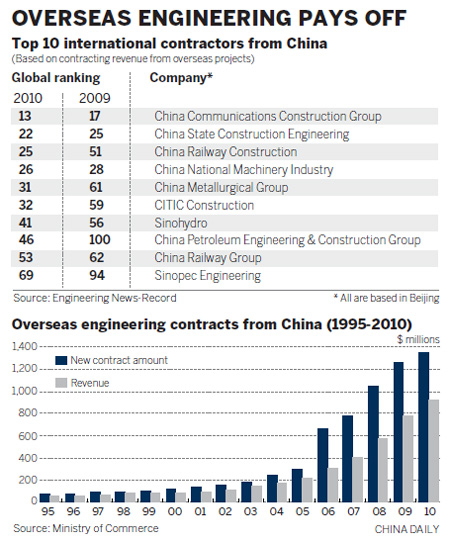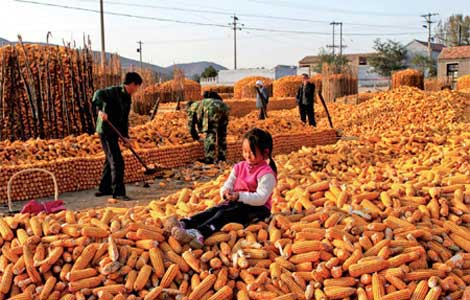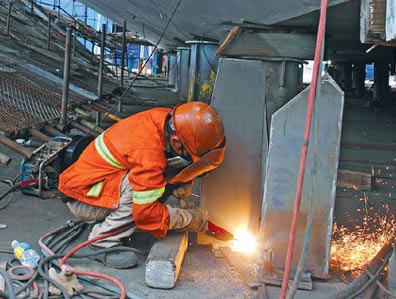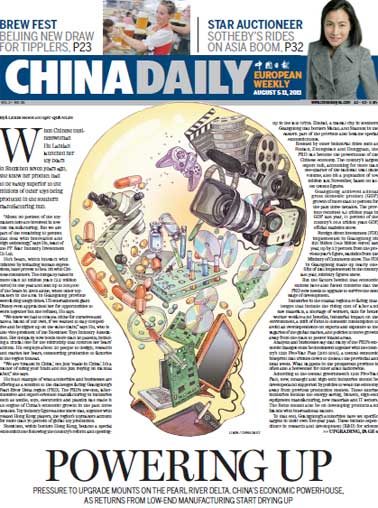Companies
Projects span the globe
Updated: 2011-08-09 07:43
By Wang Zhenghua (China Daily)
|
|
Chinese firms move up the value ladder with international contracts, Wang Zhenghua reports in Shanghai.
In one of the most challenging tasks it has ever embarked on, China's biggest heavy machinery maker, Shanghai Zhenhua Heavy Industries Co, wrapped up construction of the final four pieces of fabricated steel for the San Francisco-Oakland Bay Bridge.
Zhenhua hopes that its $350 million contract, part of a $6.3 billion reconstruction project, will foster its reputation as a top-notch builder able to meet the most stringent safety and quality specifications.
"The erection of the Bay Bridge is a milestone for Zhenhua to diversify into the bridge-building sector," company president Kang Xuezeng said at the completion ceremony on July 11 in Shanghai. "If Zhenhua is able to build the steel section for a US bridge, then we are capable of erecting any bridge in the world."
Only one month earlier, another Chinese heavyweight in international engineering projects suffered a major setback in Europe. China Overseas Engineering Group withdrew from a $447 million highway construction project in Poland after incurring heavy losses. The company became the first Chinese enterprise to win a large European highway contract just two years ago.
These projects demonstrate that China is moving up the global economic value chain and trying to break into big-league projects in the US and Europe, some experts said, as China aims to become the world's civil engineer.
Chinese enterprises have been hired to build rail lines in Venezuela, renovate subway systems in the United States and erect huge apartment complexes in Saudi Arabia - on the reputation of showcase projects such as Beijing's airport terminal and mammoth high-speed railway network.
Rising numbers
Figures from the Ministry of Commerce indicate that, from 1978 to the end of June, China had clinched overseas engineering contracts worth a total of $765.5 billion.
In the past decade, China's overseas engineering revenue grew by an average of 27.1 percent every year, while the value of newly signed contracts climbed an average of 27.6 percent each year.
After starting with housing and transportation programs in the initial periods, Chinese overseas engineering firms have diversified into sectors including power and petrochemical industries, water supply and sewage, telecommunication, and metallurgical and mining business.
The number of overseas contractors from China has exploded since their first attempts in the late 1970s. More than 2,000 Chinese enterprises now compete in international markets.
The Top 225 International Contractors list compiled last year by Engineering News-Record magazine included 54 companies from the Chinese mainland, the largest number from any country. They accounted for 13.2 percent - the largest share - of the $383.8 billion in revenue generated by the 225 contractors in 2009 from projects outside their home countries.
Advantages
Executives and officials said the full financial force of the Chinese government behind its infrastructure companies gives those companies an edge that is hard for private industry elsewhere to beat.
An example is the Bay Bridge project in California. It includes reconstruction of the eastern span of the bridge, which was heavily damaged in a magnitude 6.9 earthquake in 1989.
State-owned Zhenhua was selected, despite its lack of experience in bridge building, because of advantages including its huge steel fabrication facilities and a low-cost work force of roughly 35,000 people.
The decision to save some $400 million by outsourcing the fabrication of the main sections of the bridge reflected global realities, especially of the aging American steel industry, said Steve Heminger, executive director of San Francisco's Metropolitan Transportation Commission. The Chinese company also had the ability to make and deliver both the new sections of the bridge and the huge crane needed to lift them into place, he said.
Diligent workers
Low-cost labor also helped China Overseas Engineering win the highway project in Poland, although the company had to back out in June. The group had said it could build a kilometer of motorway for 6.6 million euros ($9.35 million), underbidding the price of its most expensive rival by nearly 200 percent.
"The Chinese work day and night, 12 hours a day, seven days a week, and even during holidays," Krzysztof Lenarczyk, a Wiskitki town hall official in charge of infrastructure, told Agence France Press. "They started work in January (when public construction works are suspended in Poland) and they worked throughout the worst sub-zero weather."
"Chinese companies could make money from projects that Europeans deemed impossible to profit from. The main reasons are Chinese people's diligence and the country's cheap work force," said Li Jun, an assistant researcher at China Institute of Contemporary International Relations.
Road ahead
Overseas contractors from China have developed abundant accounts of working capital, techniques and expertise over the past 30 years, primarily in developing countries eager to upgrade their infrastructure. Now they have the confidence to take on more overseas building projects, especially in developed economies, experts said.
"The advantages in Asian and African markets are consolidated while breakthroughs are made in Europe and the United States," said Diao Chunhe, president of the China International Contractors Association.
"China has moved from simply exporting labor service to securing projects that include design, outsourcing and contracting," said Hu Huimeng, deputy chief engineer of China Overseas Engineering Group. These projects require stronger know-how in implementation, risk management and financing, he said.
But Chinese companies lag in management skills and the ability to adapt to local markets, especially in developed economies with established laws and procedures on labor practices and environmental protection.
"We need to learn how to play the games in line with their rules," Hu said.
China also needs to cultivate a talent pool for overseas engineering and reduce its reliance on the low-cost labor force, professionals said.
"It is time to be confident, but not yet to be proud," according to Xiang Haifan, a professor at Tongji University and a member of the Chinese Academy of Engineering. He made the comment at the July ceremony celebrating Zhenhua's work on the Bay Bridge.
In the bridge-building sector, he said by way of example, a Chinese company may be able to offer lower cost because of its cheap work force, but China might be less competitive in its bridge construction abilities than Japan or South Korea.
Lu Wenxue, a councilor of China International Economic Cooperation Society, said "delicacy management" is urgently needed to direct China's overseas building projects. "We are expanding fast, but we lack the cross-culture training program and consulting services," he said.
Qiu Chuang, chairman of Chartered Institute of Building North China and adjunct professor of Tsinghua University, sees the fundamental task as the cultivation of talented people. The skill levels of engineering consultants and project managers do not yet match the need in overseas projects, he said, and such expertise is crucial.
Li Sixiao contributed to this report.

(China Daily 08/09/2011 page1)
E-paper

My Chinese Valentine
Local businesses are cashing in on a traditional love story involving a cow herder and a goddess
Outdoor success
Lifting the veil
Allure of mystery
Specials

Star journalist leaves legacy
Li Xing, China Daily's assistant editor-in-chief and veteran columnist, died of a cerebral hemorrhage on Aug 7 in Washington DC, US.

Sowing the seeds of doubt
The presence in China of multinationals such as Monsanto and Pioneer is sparking controversy

Lifting the veil
Beijing's Palace Museum, also known as the Forbidden City, is steeped in history, dreams and tears, which are perfectly reflected in design.

